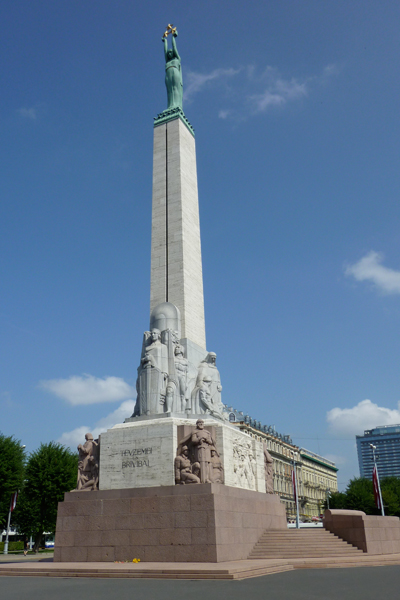 In Latvia, there are two major groups of people, Latvians and Russian speakers among them, non-citizens. After the independence in 1991, the State has granted Latvian citizenship to persons born before the country's annexation by the Soviet Union in 1940 or their descendants.
In Latvia, there are two major groups of people, Latvians and Russian speakers among them, non-citizens. After the independence in 1991, the State has granted Latvian citizenship to persons born before the country's annexation by the Soviet Union in 1940 or their descendants. The status of that people arrived during this period remains unclear. Either they returned to Russia, or they learnt Latvian and were tested on the history and culture of the country knowledges to obtain citizenship. The others have a Latvian non-citizen passport, a status created in 1995. These statelesses, as there is less and less in Europe, have the same rights as the Latvians but are exempt from military service, can not work in the police and have no right to vote.
It is really a special situation since Latvians make up only 59% of the population in 2009 (75% in 1935 and 52% in 1989) against 28% of Russians (10.5% in 1935 and 34% in 1984). The problems of communication and social integration are many. Indeed, the state adopts a particular position in which at the same time passed laws for the protection of Latvian culture, folklore and financed Russian-speaking schools. Event if the students have to follow 60% of the classes in Latvian during high school, many of them are not feeling Latvian but rather Russian.
International institutions call from time to time the Latvian government to quicken the naturalization process, reduce the differences between the rights of citizens and non-citizens and to authorize local voting rights to non-citizen.
Local partie is not sharing the same opinion, according to a 2005 survey, 42.8% of people refused to give local voting rights to non-citizens, Latvians accounted for 55.9% of respondents (by uzskata starpetniskajām attiecībām Latvija - Riga: SKDS, 2005.)
The languages mingle in everyday life: it is not uncommon to find magazines in Latvian and Russian in the kiosks, sometimes on the street, pedestrians will address you in Russian. For them, it's normal, it's their language. Mara was telling me that his brother-in-law speaks only Russian, but understands Latvian. She speaks both.
During the Russification in the 50s and 60s, many Latvians were deported to Siberia and "replaced" by the Russians. Today, it is not uncommon to see elderly people who speak only Russian, despite 50 years of settleling in Latvia. Just having the status of non-citizens gives them an advantage: no visa to travel to Europe, better mobility, rights almost identical to Latvians citizens. In November 2005, approximately 109,000 people had applied for Latvian citizenship and 103 000 obtained it.
Now that the country is part of the European Union, many Latvians hoped to assert their identity and status gradually detach from the pejorative " coming from Eastern Europe" (as heard as being part of the Soviet Union). Mara feels European, loves the freedom of movement she can have and especially the facilities it brings. She is a true European: she comes from Russia, Poland and Latvia. Today, she does not feel embarrass with the fact that there are two communities if her country. Making an effort for the country in which we live, especially in terms of learning the language is essential. Unfortunately, not everyone agrees.








